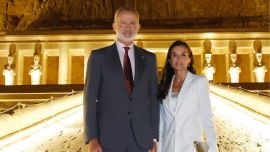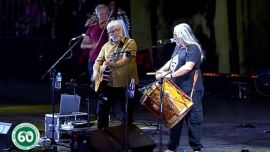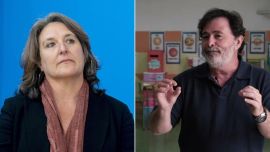In a sprawling interview assessing his 10 years as the leader of the Catholic Church, Pope Francis has admitted that his mortality is playing on his mind and cast doubt over how long left he has left in the position.
The 86-year-old Buenos Aires-born pontiff made the confession during a lengthy conversation with Perfil journalist Jorge Fontevecchia, which will be published over the weekend.
Reflecting on the death of his predecessor at the Vatican, Benedict XVI, Francis said that he personally is today in good health, though he has been “thinking a lot” about his mortality.
The interview was held in Vatican City and lasted almost three hours. The pontiff touched on almost every subject, from theology and philosophy, paedophilia and sexual abuse in the Church, the war in Ukraine and the possibility of a third world war, and why he hasn't visited Argentina yet as pontiff.
The pontiff also expressed concern over the the rise of the right, not only in Argentina but in much of the world. "The exaggerated, rootless right wing is very dangerous, it worries me," he confessed as he discussed liberalism.
In more controversial remarks, the Pope also warned about the “very dangerous” and "harmful" impact of “gender ideology,” expressed his thoughts on his homeland and its recent sweeping abortion reform bill and admitted that he misses “strolling around the streets” of Argentina’s capital.
Francis discussed the shift in direction that the Church has taken under his leadership. When the interview moved onto the topic of reform, the papal response was: “When you have to carry out reforms, this presupposes a certain discipline and applause from the outside because it’s not something you like to do. What needs to be done can also be seen more clearly from the outside than when you have to suffer the complaints.”
Discussing the pushback he has received from the conservative branch of Church theologians, the pontiff declared: “When setting limits or changing course, it is a matter of domestic and social discipline.”
He declared, however, that "the right to complain, which exists in the Church, must be respected."
Francis then dipped into more personal areas, confessing that as he ages, his thoughts are turning towards the end.
Quizzed as to whether the recent funeral of Benedict XVI (a unique event since a Pope had never attended a papal funeral by definition before) had prompted him to contemplate his own mortality, the pontiff admitted that the death of the pope emeritus affected him.
“Reaching my age in good health is a grace but I don’t know how long that’s going to last, so this has set me to thinking quite a lot about that,” he said.
“Not at the funeral, where my duty was to pay tribute to his memory, but I do think about it habitually. I thought about it when I went to see him two days before he died when the poor man’s health was collapsing and I thought that when the end is near, you feel it more: 'It's going to be your turn,'"
Same-sex marriage and abuse
Asked about same-sex marriages, the Pope explained that in a recent interview he had reiterated that “homosexuality is not a crime but it is a sin,” adding that he had already raised the topic three times in the first year of his papacy (2013), including his frequently quoted statement during his flight to Río Janeiro (“If a person is a homosexual and seeks God, who am I to judge him?”), while in Ireland he urged the parents of homosexual children not to throw them out of the house but accept them as part of their the family.
The interview then touched upon one of the Church’s most sensitive issues, the sexual abuse of children by Catholic clergy. Responding to questioning, the pontiff said that under his leadership, the Vatican is “working on it continuously.”
“I want to be very objective here. The percentages that exist according to universal statistics, from the United Nations, UNICEF etc., show that between 40 and 42 percent of the abuses take place at home and in the neighbourhood,” said the pope defensively. "That old habit of covering it all up continues, first with uncles, grandfathers and neighbours, then in the clubs and then in the schools and finally in the Catholic Church, which is no more than three percent. That does not sound like much but it is because that three percent coming from Catholic priests weighs far more heavily than the other 40-plus percent ,because it is a blasphemy. If you have the vocation to become a priest or nun, you should be helping people to seek God, not eating them up alive.”
He continued: “Until the Boston scandal these things were covered up as they still habitually were by families in general although the odd priest was punished. That all changed when the Boston scandal exploded and we started to become aware within the Church. We are working on it continuously and there are some major denunciations, all starting with Benedict, eh? When hearing about these horrible things, the Church cannot allow itself the luxury of covering it up but must help to see it prudently exposed elsewhere.”
The papal response then wove into gender ideology, which he described as “very dangerous … among all today’s ideological colonisations the worst in my judgement because it both boosts the differences and makes people think there are no differences when it is contrasting the differences which leads to progress.”
Visit to Argentina?
Finally, Francis goes on to address Argentina and answers the million-peso question: Why hasn’t he visited his homeland since assuming the papacy?
He replied that he was on the point of visiting Argentina in late 2017 along with Uruguay and Chile but the latter was in the midst of elections and “I cannot visit a country during an election campaign” with the dead month of January his only alternative.
Pope Francis also denied that his decision not to visit his homeland carried a “message,” saying a trip had been scheduled in December 2017 that was later cancelled.
Given that Argentina is set to hold a crunch election later this year, he said the chances of a visit anytime soon were non-existent. “Maybe next year, I’d like that if possible but there is also the rest of the world,” said the pontiff.
Francis admitted, however, that he longs to return home, at least for a short visit.
“Strolling around the streets and taking the bus to be in contact with people – it seemed the most natural thing in the world never to use a car,” he said, looking back. “I now miss that contact with people and the streets of Buenos Aires.”
* Jorge Fontevecchia’s extensive interview with the man formerly known as Jorge Bergoglio will be published over the weekend on all of Editorial Perfil’s platforms, in print and digital in its written format this Saturday, and in video format broadcast on TV and perfil.com the same day. An edited feature-length version of the conversation, translated into English, will be printed in next week’s edition of the Buenos Aires Times.























Comments